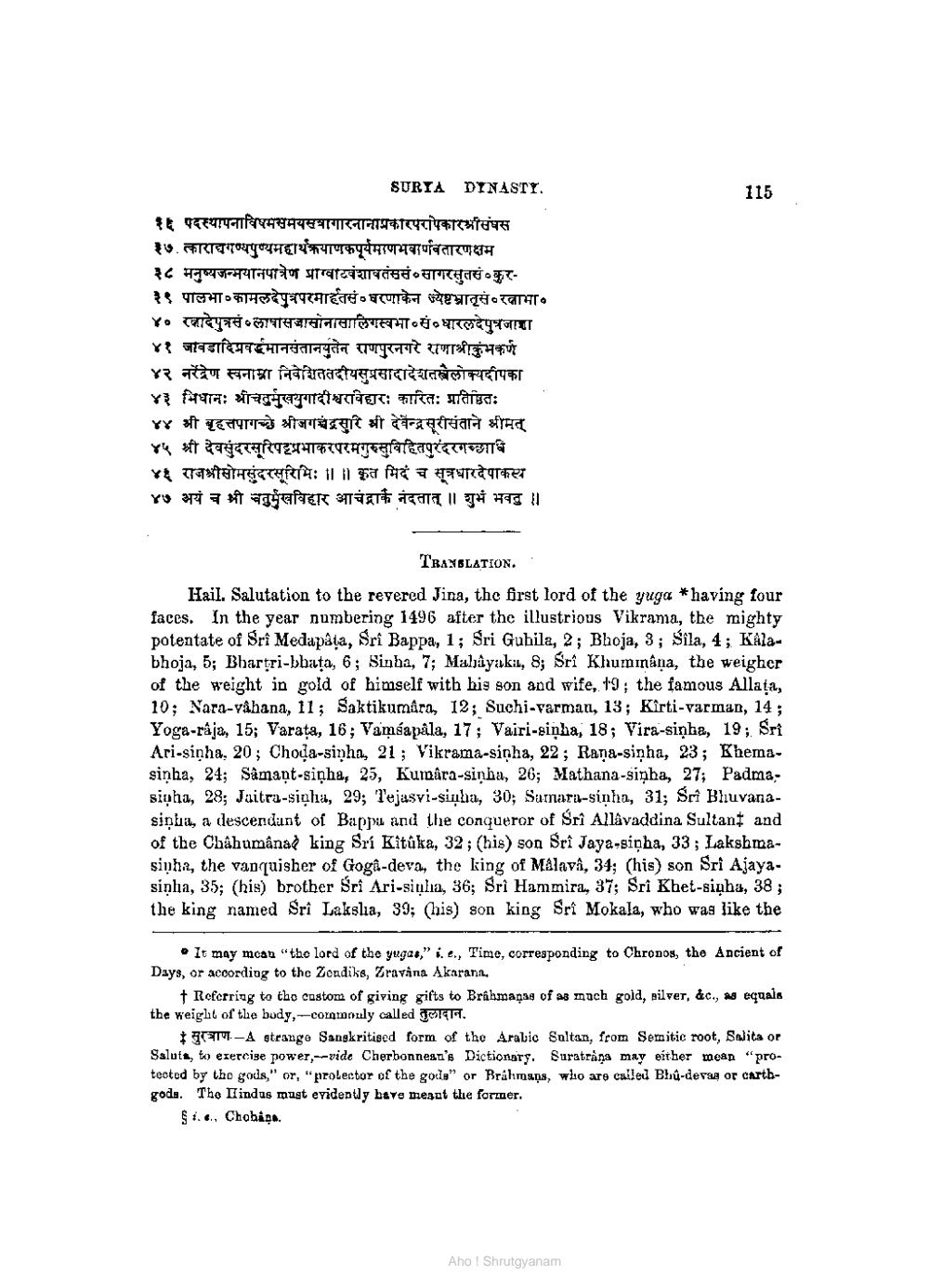________________
115
SURIA DINASTI. १६ पदस्थापनाविषमसमयसबागारनानाप्रकारपपिकारीसंघस १७. त्काराचगण्यपुण्यमहार्यक्रयाणकपूर्वमरणभवार्णवतारणक्षम ३८ मनुष्यजन्मयानपात्रेण प्राग्वाटवंशावतंससं०सागरसुतसं० कुर३९ पालभा०कामलदेपुत्रपरमार्हतसं धरणाकेन ज्येष्टभ्रातृसं रत्नाभा. ४. रजादेपुत्रसं लापासजासोनासालिगस्वभा०सं०धारलदेपुरजाहा ४१ जावडादिप्रवर्दमानसंतानयुतेन राणपुरनगरे राणाश्रीकुंभकर्ण ४२ नरेंद्रेण स्वनामा निवेशिततदीयसुप्रसादादेशतस्त्रैलोक्यदीपका ४३ भिधानः श्रीचतुर्मुखयुगादीश्वरविहारः कारितः प्रतिष्ठितः ४४ श्री बृहत्तपागच्छे श्रीजगञ्चंद्रसुरि श्री देवेन्द्रसूरीसंताने श्रीमत् ४५ श्री देवसुंदरसूरिपप्रभाकरपरमगुरुसुविहितपुरंदरगच्छाध ४६ राजश्रीसोमसुंदरसूरिमिः । ॥ कृत मिदं च सूत्रधारदेपाकस्य ४७ अयं च श्री चतुर्मुखविहार आचंद्राकै नंदतात् ॥ शुभं भवतु ॥
TRANSLATION. Hail. Salutation to the revered Jina, the first lord of the yuga *having four faces. In the year numbering 1496 after the illustrious Vikrama, the mighty potentate of Sri Medapata, Sri Bappa, 1; Sri Gubila, 2; Bhoja, 3; Sila, 4; KAlabhoja, 5; Bhartri-bbata, 6; Sinha, 7; Malayakit, 8; Sri Khuminâna, the weigher of the weight in gold of himself with his son and wife, 19; the famous Allata, 10; Nara-vahana, 11 ; Saktikumara, 12; Suchi-varman, 13; Kirti-varman, 14; Yoga-råja, 15; Varata, 16; Vamsapåla, 17; Vairi-sinha, 18; Vira-sinha, 19; Sri Ari-sinha. 20; Choda-sinha, 213 Vikrama-sinha, 22%; Rana-sinha, 233; Khemasinha, 24; Samant-sinha, 25, Kumāra-sinha, 26; Mathana-sinha, 27; Padmasinha, 28; Jaitra-sinha, 29; Tejasvi-sinha, 30; Surnara-sinha, 31; Sri Bhuvanasinba, a descendant of Baps and the conqueror of Sri Allâvaddina Sultant and of the Châhumâna king Srí Kitûka, 32;(his) son Sri Jaya-siņha, 33; Lakshmasimh2, the vanquisher of Goga-deva, the king of Målavi, 34; (his) son Sri Ajayasinha, 35%; (his) brother Sri Ari-sinha, 36; Sri Hammiral, 37; Sri Khet-sinha, 383 the king named Sri Lakslia, 39; (his) son king Sri Mokala, who was like the
It may mean "the lord of the yugat," ie, Time, corresponding to Chronos, the Ancient of Days, or according to the Zendiks, Zravana Akarana.
Roferring to tho custom of giving gifts to Brahmansg of as much gold, silver, &c., 4 equals the weight of the budy,-commnuly called तुलादान.
* FEM-A strange Sangkritised form of the Arabic Sultan, from Semitic root, Salita or Salutt, to exercise power,--vide Cherbonnent's Dictionary. Suratråna may either mean "protected by the gods" or, "protector of the gole" or Brahmaps, who are called Blu-deva or carthgods. Tho Ilindus must evidently bave mesut the former.
Si..., Chobişn.
Ahol Shrutgyanam




